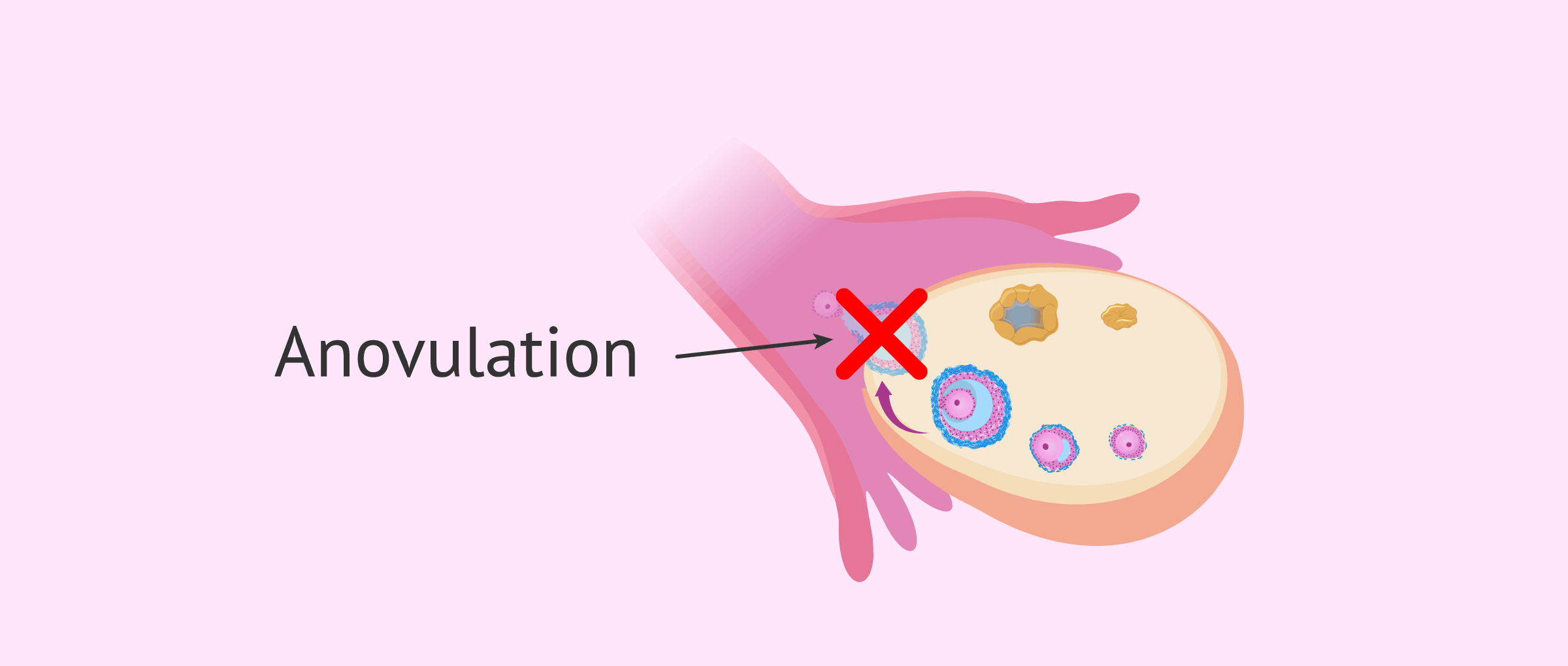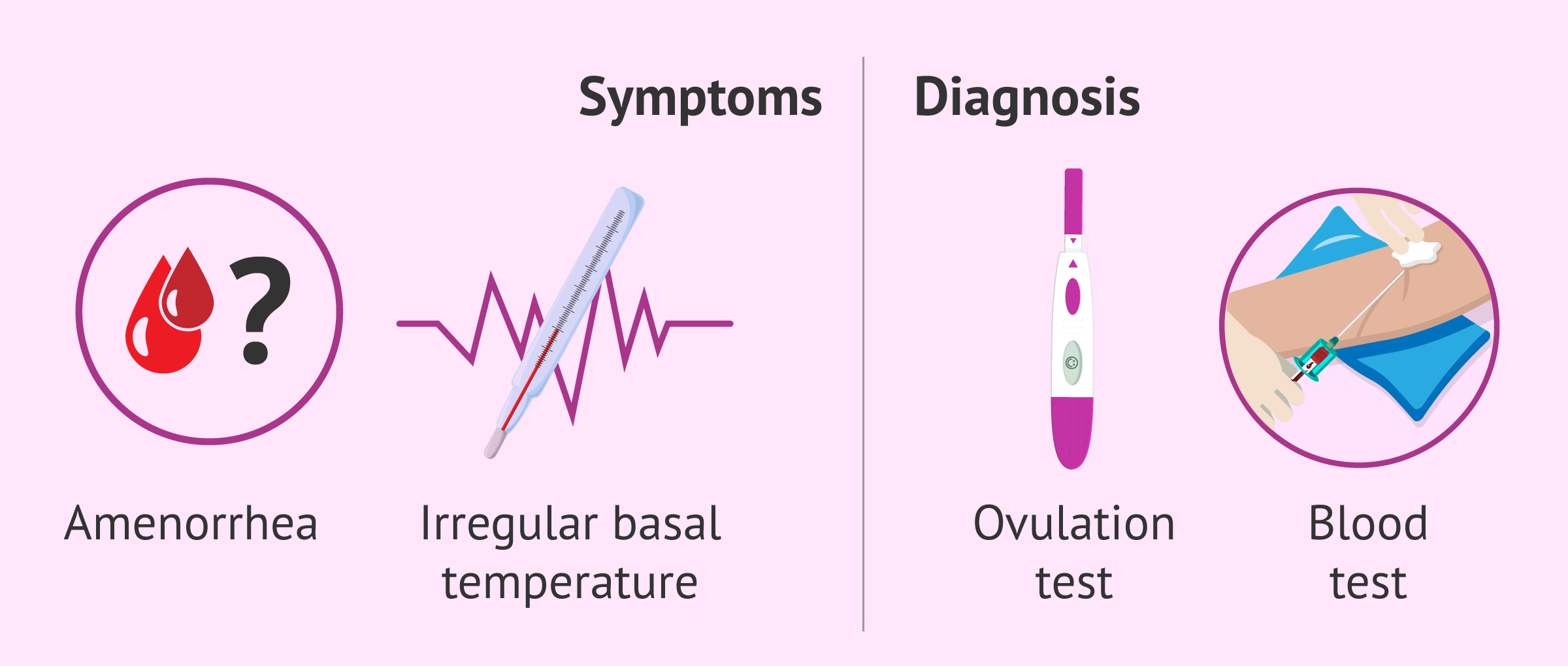Anovulation is one of the causes of female sterility. A woman's ovaries are not capable of releasing any eggs at any time during the menstrual cycle and, therefore, fertilization cannot take place.
Normally, this lack of ovulation is due to hormonal alterations, such as in polycystic ovary syndrome (PCOS) or hyperprolactinemia.
On the other hand, there are also normal physiological situations in which a woman cannot ovulate. These would be the cases in pregnancy and breastfeeding.
Provided below is an index with the 8 points we are going to expand on in this article.
- 1.
- 2.
- 2.1.
- 2.2.
- 2.3.
- 3.
- 4.
- 5.
- 5.1.
- 5.2.
- 5.3.
- 5.4.
- 5.5.
- 5.6.
- 6.
- 7.
- 8.
Ovulation problems
During a woman's normal menstrual cycle, a mature egg is released that can be fertilized by a sperm to produce an embryo and pregnancy takes place.
When the ovary is unable to expel the egg, a disorder called anovulationtakes place which means ovulation doesn’t occur.
Anovulation may be circumstantial or chronic. The lack of persistent ovulation over time is considered one of the most important causes of female infertility and can also lead to other long-term health problems, such as diabetes mellitus 2.
Another cause of female sterility related to the ovulatory cycle is disovulation, which consists of ineffective ovulation, i.e. the ovum is not fertilizable.
What are the causes of anovulation?
The triggers of this ovulatory dysfunction can be of different kinds, as they have to do with lifestyle or certain hormonal imbalances in women.
The World Health Organization (WHO) has classified the causes of anovulation and ovulatory disorders in general into 3 large groups, which we will discuss below:
Group I: Hypothalamic-pituitary failure
The cause of the anovulation is due to the lack of secretion of GnRH and gonadotropins (FSH and LH) by the hypothalamus and pituitary gland respectively.
These hormones control the entire menstrual cycle, inducing follicular development in the ovaries and the secretion of estradiol.
The following are some disorders or situations that prevent the hypothalamus and pituitary gland from functioning properly:
- Hypogonadotropic hypogonadism
- Kallman syndrome
- Excessive physical exercise
- Weight loss and gain, especially extreme cases of anorexia and bulimia
- Systemic diseases, such as chronic kidney failure or chronic liver disease
About 10% of ovulatory dysfunctions are caused by this hypothalamus-hypophysis malfunction.
Group II: Hormonal alterations
The main cause of anovulation, which is included in this group, is the polycystic ovary syndrome (PCOS)an endocrine disorder that causes irregular menstrual cycles or amenorrhea in women.
PCOS is the cause of 80% of cases of anovulatory infertility.
Women with PCOS have enlarged ovaries with several follicles on the periphery that never mature. In addition, these women also show signs of hyperandrogenism, such as the appearance of hair on the face or acne.
On the other hand, the hyperprolatinemia(increased prolactin hormone) and thyroid disorders (hyperthyroidism and hypothyroidism) also cause anovulation.
Group III: Ovarian failure
Early ovarian insufficiency (POI), previously called premature ovarian failure (POF). accounts for 4-5% of ovulatory disorders.
The ovaries of women with PFO stop functioning before the age of 40, without having reached the average age of menopause.
Assisted procreation, as any other medical treatment, requires that you rely on the professionalism of the doctors and staff of the clinic you choose. Obviously, each clinic is different. Get now your Fertility Report, which will select several clinics for you out of the pool of clinics that meet our strict quality criteria. Moreover, it will offer you a comparison between the fees and conditions each clinic offers in order for you to make a well informed choice.
The levels of pituitary hormones are high, but the ovaries are unable to respond and therefore stop producing mature eggs and there is a lack of estrogen as well.
Symptoms and Diagnosis
The main symptom of ovulation is the absence of menstruation, also called amenorrhea.
Other possible manifestations of anovulatory cycles are irregular menstrual periods and abnormal bleeding.
In addition, women who do not ovulate also often do not have premenenstrual syndrome or the abundant, elastic cervical mucus characteristic of fertile days.
Finally, irregular basal temperature may indicate lack of ovulation.
It also can happen that menstruation occurrs on a regular basis and anovulation goes unnoticed until you try to get pregnant.
Failing to conceive, a woman can carry out different strategies to find out if she is ovulating:
- Using ovulation test
- Doing a blood test to measure the level of progesterone
- Going to the gynecologist for a pelvic exam and ultrasound
Once the female sex hormones have been analyzed and it has been confirmed that the woman does not ovulate, it will be necessary to apply a treatment that solves this anovulation problem.
Treatment
In the simplest cases, when anovulation is not caused by serious problems, natural treatment based on a healthy diet, regular physical exercise and stress management is usually sufficient to regain ovulation.
If missing ovulation derives from other hormonal alterations, such as hypothyroidism, it will be necessary to treat this disorder so that ovulation can occur.
Apart from that, in more severe cases of chronic anovulation, the doctor will have to prescribe hormonal drugs to induce ovulation. For example, clomiphene citrate or gonadotropins are the most indicated treatment for women with PCOS to ovulate.
There are occasions when it is even necessary to perform a surgical intervention to restore ovulation, such as ovarian drilling for patients with PCOS.
FAQs from users
What are the causes of anovulation?
There are several causes that can cause us not to ovulate. One of the most common is Polycystic Ovary Syndrome, a benign condition that affects many young women. It consists of an endocrine disorder that does not allow correct ovulation.
There could also be anovulation of hypothalamic or pituitary cause, such as intense physical exercise, low weight, etcetera. Other hormonal alterations such as alterations in thyroid hormone (TSH) or prolactin, can cause ovulation not to occur properly.
Advanced age would also be a cause why, in spite of having periods, in many cycles ovulation does not occur regularly.
Why does breestfeeding cause anovulation?
During lactation, the hormone prolactin is increased due to the stimulation of the breast by the baby sucking on the nipple.
This high level of prolactin, in addition to stimulating milk production, inhibits the hypothalamus and prevents the secretion of GnRH (gonadotropin-releasing hormone). As a result, the entire hypothalamus-pituitary-ovarian axis is blocked and the woman will not have ovulation or menstruation until she finishes exclusive breastfeeding.
Which contraceptive methods suppress ovulation?
Contraceptive methods based on suppressing ovulation to prevent pregnancy are those composed of hormones, such as the birth control pill among others.
The hormones contained in contraceptive methods are estrogen and progesterone, which act at the level of the pituitary gland and prevent the secretion of gonadotropins (FSH and LH) so that no follicle is developed and no egg is expelled.
Is it possible to menstruate without ovulation?
Women with anovulatory cycles may have menstruation as well. However, these women are very likely to have menstrual disorders.
Polycystic ovary syndrome (PCOS) is one of the pathologies that can be treated with anovulation. If you'd like to know more about the pathology which affects women in reproductive age, click here: What is the polycystic ovary syndrome?
Apart from the absence of menstruation, does anovulation cause other symptoms?
Dr. José León Tovar, gynecologist at Ginemed Huelva, tells us about the symptoms of anovulation:
Yes, polycystic ovarian syndrome, for example, or anovulation itself can cause menstrual disorders, i.e. irregular periods. Basal body temperature at or near periovulation can also be affected. The quality of the cervical mucus, which is as important as mucus is in the process of normal fertilization of a couple achieving pregnancy at home, can also be affected.
Can obesity cause anovulation?
Overweight and obesity can cause alterations in a woman's ovulatory cycle and menstruation. That is why most specialists recommend losing weight, as it would improve female reproductive health.
Suggested for you
In order to know why ovulatory dysfunctions occur, it is first necessary to understand well how ovulation occurs. Therefore, we encourage you to read on in the next post: What is ovulation and when does it happen?
If you want to delve deeper into the endocrine causes that cause infertility, you can access the following article: Female infertility due to endocrine origins.
We make a great effort to provide you with the highest quality information.
🙏 Please share this article if you liked it. 💜💜 You help us continue!
References
Abraham S, Mira M, Llewellyn-Jones D. Should ovulation be induced in women recovering from an eating disorder or who are compulsive exercisers? Fertil Steril. 1990 Mar;53(3):566-8 (See)
A Dunaif. Hyperandrogenic anovulation (PCOS): a unique disorder of insulin action associated with an increased risk of non-insulin-dependent diabetes mellitus. Am J Med. 1995 Jan 16;98(1A):33S-39S. doi: 10.1016/s0002-9343(99)80057-6 (See)
Hamilton-Fairley D, Taylor A. Anovulation. BMJ. 2003 Sep 6;327(7414):546-9 (See)
Luciano AA, Lanzone A, Goverde AJ. Management of female infertility from hormonal causes. Int J Gynaecol Obstet. 2013 Dec;123 Suppl 2:S9-17.
Magendzo NA. Anovulación y disfunción ovulatoria e infertilidad. Revista Médica Clínica Las Condes, 2010. 21(3): 336-497
Norman RJ, Dewailly D, Legro RS, Hickey TE. Polycystic ovary syndrome. Lancet. 2007 Aug 25;370(9588):685-97 (See)
Pietro Santulli, Chloe Tran, Vanessa Gayet, Mathilde Bourdon, Chloe Maignien, Louis Marcellin, Khaled Pocate-Cheriet, Charles Chapron, Dominique de Ziegler. Oligo-anovulation is not a rarer feature in women with documented endometriosis. Fertil Steril
. 2018 Oct;110(5):941-948. doi: 10.1016/j.fertnstert.2018.06.012 (See)
FAQs from users: 'What are the causes of anovulation?', 'Why does breestfeeding cause anovulation?', 'Which contraceptive methods suppress ovulation?', 'Is it possible to menstruate without ovulation?', 'Apart from the absence of menstruation, does anovulation cause other symptoms?' and 'Can obesity cause anovulation?'.










